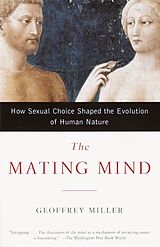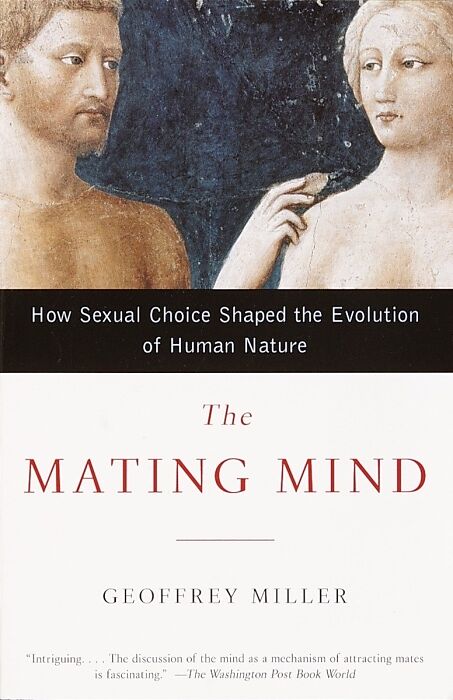The Mating Mind
Einband:
Kartonierter Einband
EAN:
9780385495172
Untertitel:
How Sexual Choice Shaped the Evolution of Human Nature
Genre:
Psychologie & Esoterik
Autor:
Geoffrey Miller
Herausgeber:
ANCHOR
Auflage:
Anchor Books.
Anzahl Seiten:
528
Erscheinungsdatum:
17.04.2001
ISBN:
978-0-385-49517-2
Zusatztext Quite ingenious stuff. This is a welcome change from a lot of evolutionary psychology." The New York Times Book Review Informationen zum Autor GEOFFREY F. MILLER is senior research fellow at the Centre for Economic Learning and Social Evolution at University College, London. Born in 1965 in Cincinnati, he studied at Columbia University and received a Ph.D. in cognitive psychology from Stanford University. After moving to Europe, he worked at the Universities of Sussex and Nottingham and at the Max Planck Institute of Psychological Research in Munich. He lives in Surrey with his family. Klappentext At once a pioneering study of evolution and an accessible and lively reading experience, The Mating Mind marks the arrival of a prescient and provocative new science writer. Psychologist Geoffrey Miller offers the most convincing-and radical-explanation for how and why the human mind evolved. Consciousness, morality, creativity, language, and art: these are the traits that make us human. Scientists have traditionally explained these qualities as merely a side effect of surplus brain size, but Miller argues that they were sexual attractors, not side effects. He bases his argument on Darwin' s theory of sexual selection, which until now has played second fiddle to Darwin' s theory of natural selection, and draws on ideas and research from a wide range of fields, including psychology, economics, history, and pop culture. Witty, powerfully argued, and continually thought-provoking, The Mating Mind is a landmark in our understanding of our own species. Central Park Central Park divides two of Manhattan's greatest treasure collections. On the West Side stands the American Museum of Natural History, with its dinosaur fossils, stuffed African elephants, dioramas of apes, and displays of ancient human remains. On the East Side stands the Metropolitan Museum of Art, with its Rembrandt self-portraits, peacock-shaped sitar, gold rapiers, Roman temple, Etruscan mirrors, and Jacques Louis David's Death of Socrates. These works symbolize our unique human capacities for art, music, sports, religion, self-consciousness, and moral virtue, and they have troubled me ever since my student days studying biology at Columbia University. It was easy enough for me to take a taxi along the West Seventy-ninth Street transverse (the natural history museum) to East Eighty-first Street (the Met). It was not so easy for our ancestors to cross over from the pre-human world of natural history to the world of human culture. How did they transform themselves from apes to New Yorkers? Their evolutionary path seems obscure. Yet we know there must have been a path. The human mind evolved somehow. The question scientists have asked for over a century is: How? Most people equate evolution with "survival of the fittest," and indeed most theories about the mind's evolution have tried to find survival advantages for everything that makes humans unique. To extend the metaphor, one kind of theory suggests our problem was not following the transverse to a collection of decorative arts, but traveling a different route to some useful inventions. Perhaps the human mind evolved for military prowess, symbolized by the Sea-Air-Space Museum on the aircraft carrier USS Intrepid, docked at Pier 86. Or perhaps our minds evolved for reciprocal economic advantage, symbolized by the World Trade Center and Wall Street, or through a thirst for pure knowledge, as housed in the New York Public Library. The survival advantages of better technology, trade, and knowledge seem obvious, so many believe the mind's evolution must have been technophilic and survivalist. Ever since the Darwinian revolution, this survivalist view has seemed the only scientifically respectable possibility. Yet it remains unsatisfying. It leaves too many riddles unexplained. Human language evolved to ...
#8220;Quite ingenious stuff…. This is a welcome change from a lot of evolutionary psychology."–The New York Times Book Review
Autorentext
GEOFFREY F. MILLER is senior research fellow at the Centre for Economic Learning and Social Evolution at University College, London. Born in 1965 in Cincinnati, he studied at Columbia University and received a Ph.D. in cognitive psychology from Stanford University. After moving to Europe, he worked at the Universities of Sussex and Nottingham and at the Max Planck Institute of Psychological Research in Munich. He lives in Surrey with his family.
Klappentext
At once a pioneering study of evolution and an accessible and lively reading experience, The Mating Mind marks the arrival of a prescient and provocative new science writer. Psychologist Geoffrey Miller offers the most convincing-and radical-explanation for how and why the human mind evolved.
Consciousness, morality, creativity, language, and art: these are the traits that make us human. Scientists have traditionally explained these qualities as merely a side effect of surplus brain size, but Miller argues that they were sexual attractors, not side effects. He bases his argument on Darwin' s theory of sexual selection, which until now has played second fiddle to Darwin' s theory of natural selection, and draws on ideas and research from a wide range of fields, including psychology, economics, history, and pop culture. Witty, powerfully argued, and continually thought-provoking, The Mating Mind is a landmark in our understanding of our own species.
Leseprobe
Central Park
Central Park divides two of Manhattan's greatest treasure collections. On the West Side stands the American Museum of Natural History, with its dinosaur fossils, stuffed African elephants, dioramas of apes, and displays of ancient human remains. On the East Side stands the Metropolitan Museum of Art, with its Rembrandt self-portraits, peacock-shaped sitar, gold rapiers, Roman temple, Etruscan mirrors, and Jacques Louis David's Death of Socrates.
These works symbolize our unique human capacities for art, music, sports, religion, self-consciousness, and moral virtue, and they have troubled me ever since my student days studying biology at Columbia University. It was easy enough for me to take a taxi along the West Seventy-ninth Street transverse (the natural history museum) to East Eighty-first Street (the Met). It was not so easy for our ancestors to cross over from the pre-human world of natural history to the world of human culture. How did they transform themselves from apes to New Yorkers? Their evolutionary path seems obscure.
Yet we know there must have been a path. The human mind evolved somehow. The question scientists have asked for over a century is: How? Most people equate evolution with "survival of the fittest," and indeed most theories about the mind's evolution have tried to find survival advantages for everything that makes humans unique. To extend the metaphor, one kind of theory suggests our problem was not following the transverse to a collection of decorative arts, but traveling a different route to some useful inventions. Perhaps the human mind evolved for military prowess, symbolized by the Sea-Air-Space Museum on the aircraft carrier USS Intrepid, docked at Pier 86. Or perhaps our minds evolved for reciprocal economic advantage, symbolized by the World Trade Center and Wall Street, or through a thirst for pure knowledge, as housed in the New York Public Library. The survival advantages of better technology, trade, and knowledge seem obvious, so many believe the mind's evolution must have been technophilic and survivalist.
Ever since the Darwinian revolution, this survivalist view has seemed the only scientifically respectable possibility. Yet it remains unsatisfying. It leaves too many riddles unexplained. Human language evolved to be much more elaborate than necessary for basic survival functions. From a pra…

Leider konnten wir für diesen Artikel keine Preise ermitteln ...
billigbuch.ch sucht jetzt für Sie die besten Angebote ...
Die aktuellen Verkaufspreise von 6 Onlineshops werden in Realtime abgefragt.
Sie können das gewünschte Produkt anschliessend direkt beim Anbieter Ihrer Wahl bestellen.
Loading...
Die aktuellen Verkaufspreise von 6 Onlineshops werden in Realtime abgefragt.
Sie können das gewünschte Produkt anschliessend direkt beim Anbieter Ihrer Wahl bestellen.
| # | Onlineshop | Preis CHF | Versand CHF | Total CHF | ||
|---|---|---|---|---|---|---|
| 1 | Seller | 0.00 | 0.00 | 0.00 |
